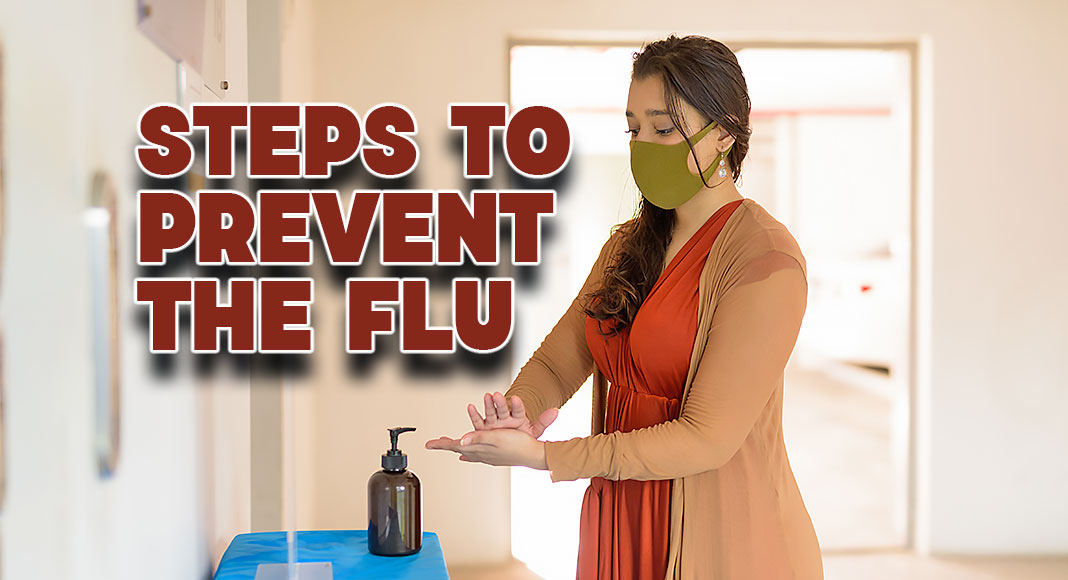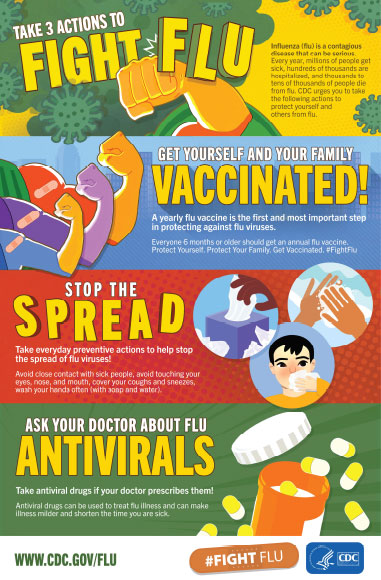
Mega Doctor News
Preventive Steps
Take time to get a flu vaccine.
- CDC recommends a yearly flu vaccine as the first and most important step in protecting against flu viruses.
- Flu vaccines help to reduce the burden of flu illnesses, hospitalizations and deaths on the health care system each year. (Read more about flu vaccine benefits.)
- This season, all flu vaccines will be designed to protect against the four flu viruses that research indicates will be most common. (Visit Vaccine Virus Selection for this season’s vaccine composition.)
- Everyone 6 months and older should get an annual flu vaccine, ideally by the end of October. Learn more about vaccine timing.
- Vaccination of people at higher risk of developing serious flu complications is especially important to decrease their risk of severe flu illness.
- People at higher risk of serious flu complications include young children, pregnant people, people with certain chronic health conditions like asthma, diabetes or heart and lung disease, and people 65 years and older.
- Vaccination also is important for health care workers, and other people who live with or care for people at higher risk to keep from spreading flu to them. This is especially true for people who work in long-term care facilities, which are home to many of the people most vulnerable to flu.
- Children younger than 6 months are at higher risk of serious flu illness but are too young to be vaccinated. People who care for infants should be vaccinated instead.

Take everyday preventive actions to stop the spread of germs.
- Take everyday preventive actions that are recommended to reduce the spread of flu.
- Avoid close contact with people who are sick.
- If you are sick, limit contact with others as much as possible to keep from infecting them.
- Cover coughs and sneezes.
- Cover your nose and mouth with a tissue when you cough or sneeze. Throw the tissue in the trash after you use it.
- Wash your hands often with soap and water. If soap and water are not available, use an alcohol-based hand rub.
- Avoid touching your eyes, nose, and mouth. Germs spread this way.
- Clean and disinfect surfaces and objects that may be contaminated with viruses that cause flu.
- For flu, CDC recommends that people stay home for at least 24 hours after their fever is gone except to get medical care or other necessities. Fever should be gone without the need to use a fever-reducing medicine. Note that the stay-at-home guidance for COVID-19 may be different. Learn about some of the similarities and differences between flu and COVID-19.
Take flu antiviral drugs if your doctor prescribes them.
- If you are sick with flu, antiviral drugs can be used to treat your illness.
- Antiviral drugs are different from antibiotics. They are prescription medicines (pills, liquid or an inhaled powder) and are not available over-the-counter.
- Flu antiviral drugs can make flu illness milder and shorten the time you are sick. They may also prevent serious flu complications. For people with higher risk factors [308 KB, 2 Pages], treatment with an antiviral drug can mean the difference between having a milder illness versus a very serious illness that could result in a hospital stay.
- Studies show that flu antiviral drugs work best for treatment when they are started within 2 days of getting sick, but starting them later can still be helpful, especially if the sick person has a higher risk factor or is very sick from flu.
- If you are at higher risk from flu and get flu symptoms, call your health care provider early so you can be treated with flu antivirals if needed. Follow your doctor’s instructions for taking this drug.
Flu symptoms include fever, cough, sore throat, runny or stuffy nose, body aches, headache, chills and fatigue. Some people also may have vomiting and diarrhea. People may be infected with flu and have respiratory symptoms without a fever. Visit CDC’s website to find out what to do if you get sick with flu. Learn about some of the similarities and differences between flu and COVID-19, and the difference between flu and the common cold.
Information Source: CDC









